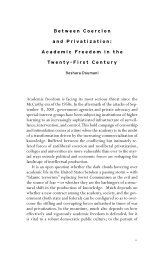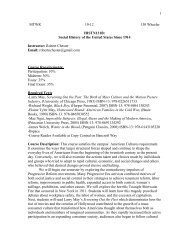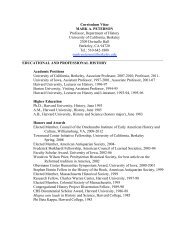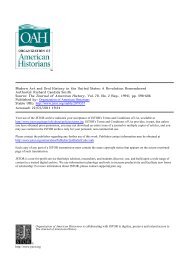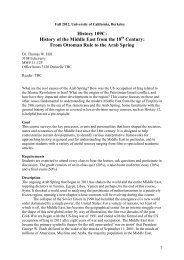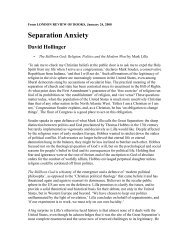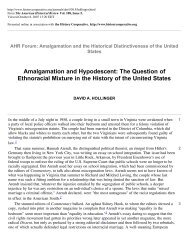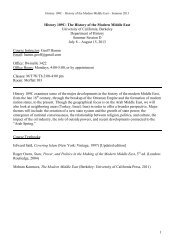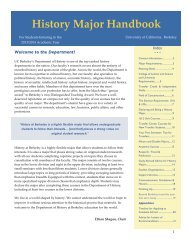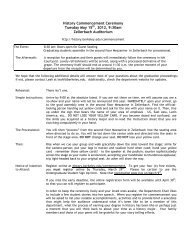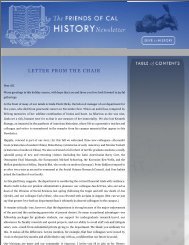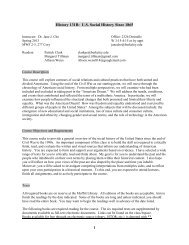My Grandmother and Other Stories: Histories of the Palestinians as ...
My Grandmother and Other Stories: Histories of the Palestinians as ...
My Grandmother and Other Stories: Histories of the Palestinians as ...
You also want an ePaper? Increase the reach of your titles
YUMPU automatically turns print PDFs into web optimized ePapers that Google loves.
army camps, were much more degenerate than those who lived in villages<br />
<strong>and</strong> towns away from military centres. 11<br />
Yet despite <strong>the</strong> judgmental <strong>and</strong> moralistic tone <strong>of</strong> <strong>the</strong> two writers, <strong>the</strong>y were<br />
ambivalent about <strong>the</strong> impact <strong>of</strong> war on Palestine’s destiny. They felt that war<br />
contained an element <strong>of</strong> progress, <strong>of</strong> discipline, <strong>and</strong> certainly <strong>the</strong> ushering in <strong>of</strong> an<br />
era <strong>of</strong> nationalism to <strong>the</strong> Arab E<strong>as</strong>t. Their fears were <strong>as</strong> much <strong>the</strong> result <strong>of</strong> uncertainty<br />
towards <strong>the</strong> new secular modernity <strong>as</strong> <strong>the</strong>y were a feeling <strong>of</strong> une<strong>as</strong>e about <strong>the</strong><br />
unknown future <strong>of</strong> Palestine with <strong>the</strong> loss <strong>of</strong> <strong>the</strong> Ottoman mo<strong>the</strong>rl<strong>and</strong>.<br />
In <strong>the</strong> historiography <strong>of</strong> <strong>the</strong> First War, <strong>the</strong> evolution <strong>of</strong> Arab <strong>and</strong> Turkish nationalism<br />
is now being rethought. Among Arab historians, this h<strong>as</strong> mainly taken <strong>the</strong> form <strong>of</strong><br />
rectifying <strong>the</strong> nationalist historiography <strong>of</strong> scholars like Khaldun Sati al-Husary. 12 On<br />
<strong>the</strong> Turkish side, <strong>the</strong>re is also a re-examination <strong>of</strong> <strong>the</strong> issue <strong>of</strong> an Arab ‘betrayal’ <strong>of</strong><br />
<strong>the</strong> Ottomans during <strong>the</strong> Arab Revolt <strong>of</strong> 1916-1917. Historian Gurcel Goncu noted<br />
recently that Arab recruits constituted about 300,000 soldiers, a third <strong>of</strong> <strong>the</strong> total<br />
Ottoman forces in 1914–far more than <strong>the</strong> total number <strong>of</strong> soldiers who followed <strong>the</strong><br />
banner <strong>of</strong> <strong>the</strong> Arab Revolt. 13 In <strong>the</strong> 2004 ceremonies marking <strong>the</strong> 88 th anniversary <strong>of</strong><br />
<strong>the</strong> Ottoman victory at Gallipoli, <strong>the</strong> participation <strong>of</strong> individual soldiers from various<br />
countries, such <strong>as</strong> New Zeal<strong>and</strong>, Australia, <strong>and</strong> o<strong>the</strong>r Western nations w<strong>as</strong> duly noted,<br />
but not <strong>the</strong> impressive absence <strong>of</strong> soldiers from <strong>the</strong> Arab provinces, all <strong>of</strong> whom were<br />
subsumed under <strong>the</strong> Ottoman banner.<br />
Australian historian Bill Sellers noted that Mustafa Kemal (Ataturk) succeeded in<br />
defeating Allied attacks in large part <strong>as</strong> a result <strong>of</strong> <strong>the</strong> fighting stamina <strong>of</strong> his Arab<br />
recruits. “Two-thirds <strong>of</strong> <strong>the</strong> troops who made up his 19 th Division…who faced <strong>the</strong><br />
first wave <strong>of</strong> <strong>the</strong> Allied inv<strong>as</strong>ion were Syrian Arabs [i.e. soldiers from Lebanon,<br />
Jordan, Syria <strong>and</strong> Palestine], comprising <strong>the</strong> 72 nd <strong>and</strong> 77 th regiments <strong>of</strong> <strong>the</strong> Ottoman<br />
army.” 14 Of <strong>the</strong> 87,000 troops who died defending Gallipoli <strong>and</strong> <strong>the</strong> Dardanelles Straits,<br />
many were Arabs. Yet <strong>the</strong>se victories are portrayed today <strong>as</strong> Turkish, not Ottoman,<br />
victories. This pattern is equally true for <strong>the</strong> battles <strong>of</strong> al-Arish, Suez, Gaza, Megiddo<br />
<strong>and</strong> Kut al-Amara, where native soldiers (i.e. Iraqi, Hijazi, Palestinian <strong>and</strong> Syrian<br />
recruits) constituted a large component <strong>of</strong> <strong>the</strong> Ottoman troops. In <strong>the</strong> diaries <strong>of</strong> <strong>the</strong><br />
two soldiers–Mehmet (Muhammad) al-F<strong>as</strong>ih <strong>of</strong> Mersin <strong>and</strong> Ihsan al-Turjman <strong>of</strong><br />
Jerusalem–this silencing <strong>of</strong> <strong>the</strong> ethnically-mixed army comes to light, but only <strong>as</strong><br />
various nationalities’ loyalty to <strong>the</strong> idea <strong>of</strong> Ottomanism begins to crack under <strong>the</strong><br />
strain <strong>of</strong> <strong>the</strong> war.<br />
[ 32 ] HISTORICAL FEATURES The Short Life <strong>of</strong> Private Ihsan



